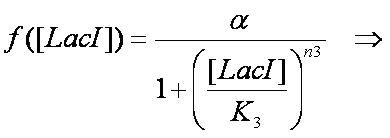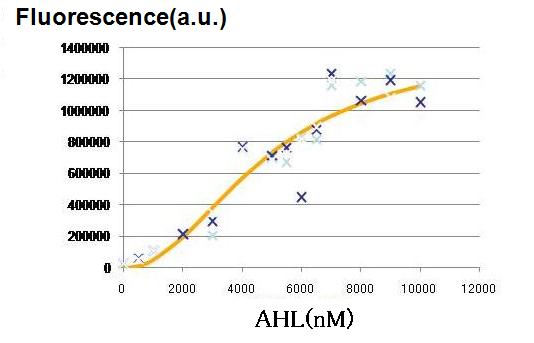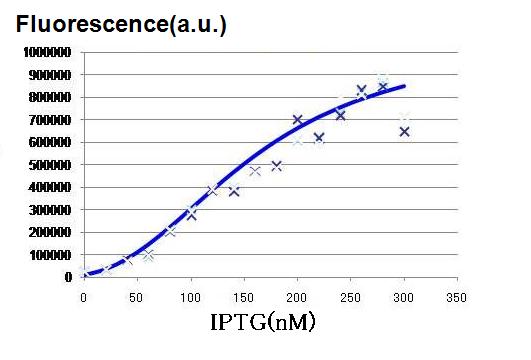Tokyo/Works/Assay
From 2007.igem.org
| (2 intermediate revisions not shown) | |||
| Line 29: | Line 29: | ||
<br><br> | <br><br> | ||
'''Result & Conclusion''' | '''Result & Conclusion''' | ||
| - | <br>GFP fluorescence increased in AHL-dose dependent manner, indicating that the hybrid promoter is enhanced by LuxR via AHL. Taken together with the graph shown in | + | <br>GFP fluorescence increased in AHL-dose dependent manner, indicating that the hybrid promoter is enhanced by LuxR via AHL. Taken together with the graph shown in Fig.1 and formulation of Hill function fitting described above , the characteristics of the hybrid promoter expressed in Hill function, such as (n2,K2), are determined. |
<br> | <br> | ||
| Line 41: | Line 41: | ||
[[Image:hill IPTG.JPG|thumb|215px|'''Fig. 2 Effect of LacI on hybrid promoter''' Enhanced fluorescence intensity represents down-regulation of LacI repression via IPTG.|left]] | [[Image:hill IPTG.JPG|thumb|215px|'''Fig. 2 Effect of LacI on hybrid promoter''' Enhanced fluorescence intensity represents down-regulation of LacI repression via IPTG.|left]] | ||
'''Objective''' | '''Objective''' | ||
| - | By testing how LacI represses lux-lac hybrid promoter, parameters(n3,K3) should be decided. In order to adjust effective concentration of LacI, IPTG was added. | + | By testing how LacI represses the lux-lac hybrid promoter, parameters(n3,K3) should be decided. In order to adjust effective concentration of LacI, IPTG was added. |
<br><br> | <br><br> | ||
'''Result & Conclusion''' | '''Result & Conclusion''' | ||
| - | GFP fluorescence intensity was enhanced in IPTG-dose dependent manner. It indicates that the LacI repression was getting weak by adding IPTG. Taken together with the graph shown in Fig. 2 and the formulation of Hill function fitting described above, the characteristics of the hybrid promoter expressed in Hill function was determined. | + | GFP fluorescence intensity was enhanced in an IPTG-dose dependent manner. It indicates that the LacI repression was getting weak by adding IPTG. Taken together with the graph shown in Fig. 2 and the formulation of Hill function fitting described above, the characteristics of the hybrid promoter expressed in Hill function was determined. |
==== ==> see more [[Tokyo/IPTG assay|details]]==== | ==== ==> see more [[Tokyo/IPTG assay|details]]==== | ||
<br> | <br> | ||
Latest revision as of 04:53, 27 October 2007
Works top 0.Hybrid promoter 1.Formulation 2.Assay1 3.Simulation 4.Assay2 5.Future works
Objective of this assay Effect of AHL Effect of LacI-IPTG Preliminary assays
Objective of this assay (Hill function fitting)
We have obtained data for our newly devised hybrid promoter. By Hill function fitting, we have determined n2, n3, K2, and K3.
==> see more details
Effect of AHL
Objective
By testing how AHL activates lux-lac hybrid promoter, parameters(n2,K2) should be determined.
Result & Conclusion
GFP fluorescence increased in AHL-dose dependent manner, indicating that the hybrid promoter is enhanced by LuxR via AHL. Taken together with the graph shown in Fig.1 and formulation of Hill function fitting described above , the characteristics of the hybrid promoter expressed in Hill function, such as (n2,K2), are determined.
==> see more details
Effect of LacI: IPTG assay
Objective
By testing how LacI represses the lux-lac hybrid promoter, parameters(n3,K3) should be decided. In order to adjust effective concentration of LacI, IPTG was added.
Result & Conclusion
GFP fluorescence intensity was enhanced in an IPTG-dose dependent manner. It indicates that the LacI repression was getting weak by adding IPTG. Taken together with the graph shown in Fig. 2 and the formulation of Hill function fitting described above, the characteristics of the hybrid promoter expressed in Hill function was determined.
==> see more details
Appendix: Preliminary assays
We conducted preliminary assays as practice experiments and check of materials and methods.
==> See more details
Before(Formulation) << Assay1 >> Assay1 contents >>>> Simulation




